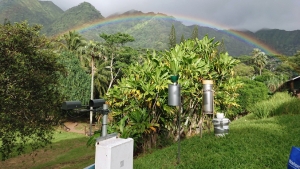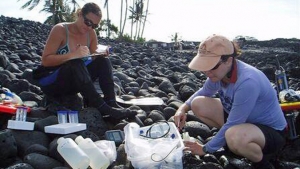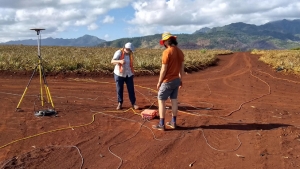As the University of Hawaiʻi Hawaiʻi EPSCoR ʻIke Wai project enters into its final year, researchers will share significant project results with the international community that could provide decision support for improved water resource management around the globe.
ʻIke Wai in partnership with the UH Water Resources Research Center (WRRC) is hosting the International Tropical Islands Water Conference to engage with water scientists, water managers and community members. The virtual event, from April 12 to 15, 2021, is being organized in collaboration with partner water centers from Guam, the Virgin Islands and the United States Geological Survey.

“This important conference will showcase the work of the entire ʻIke Wai research team and share the major outcomes with colleagues in tropical island environments,” said UH Director of Cyberinfrastructure and Hawaiʻi EPSCoR Project Director Gwen Jacobs. “This information exchange between scientists is vital to sustaining water resources in island communities.”
In 2016, the National Science Foundation awarded $20 million to UH to do a five-year, groundbreaking study of water sustainability issues through the collaborative project. ʻIke Wai aims to ensure Hawaiʻi’s future water security through an integrated program of research, education, community engagement and decision support. The project collected new hydrological and geophysical data to develop actionable and informative models of two of Hawaiʻi’s important aquifers, their water flow and transport processes. In addition, the project aims to develop an advanced cyberinfrastructure platform to serve as a data repository and visualization and decision support tool.
International interest

Including participation from eight different countries, the conference explores a variety of themes to share cutting-edge research and aims to provide a platform to discuss and learn from each other’s experiences in managing and understanding water resources across a broad range of tropical island settings. Conference themes include climate change; watershed management; managing water for ecosystems and people; Indigenous and local knowledge, perspectives and management; leading-edge technological advances in water science and more. Virtual field trips will also be featured.
“Unlike previous WRRC-hosted conferences, this one is reaching out to the international community. It is an opportunity to talk with and listen to colleagues in corresponding positions, including scientists, water managers and stakeholders, in island communities that, while widely separated around the world, share a lot in common,” said WRRC Director and Geography Professor Tom Giambelluca.
ʻIke Wai science gateway

The online platform (ikewai.org), which will be demonstrated at the conference, is a science gateway developed by the ʻIke Wai project. It serves as the central location for data management, analysis, visualization and dissemination of all data and data products generated by the project. Geophysical, geochemistry, precipitation and marine geophysics data are among the publicly available data sets collected by the ʻIke Wai project.
Data such as the marine controlled source electromagnetic imaging of freshwater plumes and the submarine aquifer off the west coast of Hawaiʻi Island, which demonstrated twice as much freshwater is stored offshore than was previously thought, is available to download on the site.
Available data also includes compiled current and historical data sets from government, private and university sources such as water quality, well and rainfall data. Additionally, Hawaiian newspaper translations which aided in directing and educating the local community and the ʻIke Wai research team in the understanding of water in Kona, Hawaiʻi and ʻEwa, Oʻahu are also available through interactive story maps.
—By Maria Dumanlang

